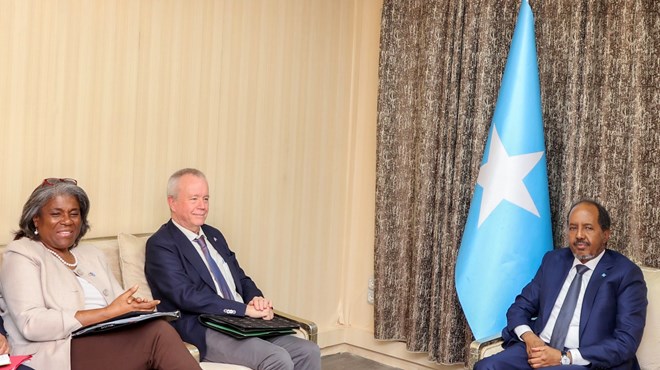Sunday, the first member of the U.S. Cabinet to travel to Somalia since 2015, pleaded with the world’s preoccupied donors to provide urgent aid to a nation suffering from a deadly famine, which she calls “the ultimate failure of the international community.”
The sternest warning on the crisis was arguably delivered to Linda Thomas-Greenfield, the U.S. ambassador to the UN: More people would “very probably” die during the current drought in Somalia than during the famine that was formally proclaimed there in 2011, when more than a quarter million people perished.
Many humanitarian officials claim that the world is turning its attention elsewhere at this moment.
During a briefing in Mogadishu, Adam Abdelmoula, the U.N. resident coordinator in Somalia, informed Thomas-Greenfield that “many of the traditional donors have washed their hands and focused on Ukraine.”
The U.S. ambassador refrained from publicly “naming and shaming” any countries in her speech asking for more donations, stating that “The countries know who we’re talking about,” but the U.N. resident coordinator didn’t hold back.
According to Abdelmoula, who spoke to The Associated Press, only 10% of the humanitarian response plan for Somalia last year was sponsored by the European Union. According to U.N. data, the EU donated $74 million and the U.K. donated $78 million. Saudi Arabia and Japan each contributed $27 million.
The United States, on the other hand, provided almost 80% of the funding, giving Somalia $1.3 billion since the start of the 2022 fiscal year. On Sunday, the ambassador disclosed an additional $40 million.
However, Thomas-Greenfield told the AP that the U.S. “can’t continue to pay at that level, even if there were no Ukraine,” adding that Washington would prefer to see nations in the immediate Gulf region, for instance, donate more.
She outlined the imminent fatal consequences if other countries don’t take action. According to the U.N., vital food and nutrition assistance to 4.6 million people in Somalia would come to an end by April if other donors do not contribute, Thomas-Greenfield warned.
That will occur right when the country’s sixth consecutive dry season is predicted to fail. She informed aid workers that the U.S. is “very disturbed” by the grave circumstances.
The ambassador spoke at the international airport in Mogadishu’s beachside diplomatic district, where diplomats holed up in bunkers work to address the escalating situation made worse by the security threat posed by al-Shabab, an affiliate of al-Qaida in East Africa, to a major portion of Somalia.
The drought, which is also affecting some areas of neighboring Ethiopia and Kenya, is believed to have claimed the lives of tens of thousands of people. According to the U.N. children’s agency, more than 500,000 children under the age of five suffer from severe acute malnutrition in Somalia alone. Millions of animals that were vital to the wellbeing and wealth of households have perished.
The U.N. and the U.S. have made it clear that the limited humanitarian aid has only postponed the worst, even though the most recent data assessment, published last year, found that Somalia had not met the requirements for a formal famine declaration.
A Western humanitarian source who spoke on the condition of anonymity because they were not permitted to talk in public said that there are about 2 million starving individuals in Somalia who have reached the stage where “bodies start to consume themselves.”
Since Somalia’s most recent famine in 2011, there are currently 2.7 million more people in need than at that time.
The fact that 900,000 of them reside in regions that are governed by the al-Shabab extremists makes it more difficult to assess the effects of the drought and provide aid to those who need it.
The number of deaths caused by the drought is still unknown, despite growing fears. Thomas-Greenfield remarked, “I don’t think any of us know the number.
John Kerry, then-secretary of state, was the final member of the Cabinet to travel to Somalia in May 2015.

